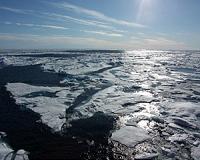 |
Ottawa (AFP) Jan 25, 2011 Canadians rank the Arctic as their top foreign policy priority and support shifting up to 3,000 troops from UN missions abroad to defend disputed claims in the far north, a survey showed Tuesday. This view puts Canada at odds with its seven Arctic neighbors and has "ominous implications" for cooperation in the resource-rich region, the EKOS poll's authors warned. The results, published by the University of Toronto's Munk School of Global Affairs and the Walter & Duncan Gordon Foundation, show that while Canadians say they welcome working with other countries, a "clear majority" also wants to increase Canada's military presence in the Arctic. Forty-three percent of Canadians said their government should pursue a firm line in defending Canadian sections of the Arctic. This hard line was echoed by 36 percent of respondents in Iceland, 34 percent in Russia and 10 percent or less in the United States, Sweden, Norway, Finland and Denmark. Fifty-eight percent of Canadians also said they support a strengthened military presence in the north to protect against international threats. "Canadians see the Arctic as our foremost foreign policy priority and one which should be resourced accordingly," said the study, noting that most respondents favor shifting military resources to the region rather than deploying them to other conflict zones. "The Arctic is seen as a crucial ingredient to our sense of national identity but, at the same time, it is also considered an under-resourced area of critical importance to our future." The researchers warned "there are some huge clashes between Canadian views on the Arctic and those of our Arctic neighbors." A vast majority of Canadians, for example, insist that the famed Northwest Passage is a Canadian waterway, "but, no one else shares this view." In addition, 49 percent of Canadians would like Ottawa to assert full sovereignty over the Beaufort Sea while 62 percent of Americans would prefer to strike a deal with Canada to carve up the disputed seabed. "Perhaps the most noteworthy and troubling conclusion of this research is that Canada stands relatively alone on many issues," the study concluded. Approximately 9,000 people in eight nations were surveyed in November for the study. Commenting on the poll, Defense Minsiter Peter MacKay said the Arctic is "a very high priority for Prime Minister Stephen Harper and our government." Canada's increased militarization of the Arctic, he added, is "in response to what Canadians expect." The country has stepped up its military alertness along its northern frontier largely in response to Russian "testing" its boundaries with military flights skirting the border, a practice not seen since the Cold War. The prime minister has also announced plans for a sensor net, more navy patrols, port and airport improvements, and a military training camp in the far north. Canada's chief of defense staff, however, has downplayed the risk of armed conflict in the Arctic itself. "There is no conventional military threat to the Arctic," General Walter Natynczyk told a Halifax defense summit in 2009. "If someone were to invade the Canadian Arctic, my first task would be to rescue them." "The Arctic is a very harsh environment," he explained. According to the US Geological Survey, the Arctic seabed holds up to 90 billion barrels of oil and 30 percent of the world's untapped gas resources. Arctic nations are locked in a tight race to gather evidence to support their claims as research suggests global warming could leave the region ice free by 2030, opening up navigation and access for oil rigs to the sea floor. The United Nations Convention on the Law of the Sea stipulates that any coastal state can claim undersea territory 200 nautical miles from their shoreline and exploit the natural resources within that zone. Canada and Russia claim the Lomonosov Ridge, a mountain chain running underneath the Arctic, as an extension of their continental shelf. Canada and Denmark also both claim the deserted Arctic isle of Hans.
Share This Article With Planet Earth
Related Links Beyond the Ice Age
 Loss Of Reflectivity In The Arctic Doubles Estimate Of Climate Models
Loss Of Reflectivity In The Arctic Doubles Estimate Of Climate ModelsCorvallis OR (SPX) Jan 19, 2011 A new analysis of the Northern Hemisphere's "albedo feedback" over a 30-year period concludes that the region's loss of reflectivity due to snow and sea ice decline is more than double what state-of-the-art climate models estimate. The findings are important, researchers say, because they suggest that Arctic warming amplified by the loss of reflectivity could be even more significant than ... read more |
|
| The content herein, unless otherwise known to be public domain, are Copyright 1995-2010 - SpaceDaily. AFP and UPI Wire Stories are copyright Agence France-Presse and United Press International. ESA Portal Reports are copyright European Space Agency. All NASA sourced material is public domain. Additional copyrights may apply in whole or part to other bona fide parties. Advertising does not imply endorsement,agreement or approval of any opinions, statements or information provided by SpaceDaily on any Web page published or hosted by SpaceDaily. Privacy Statement |